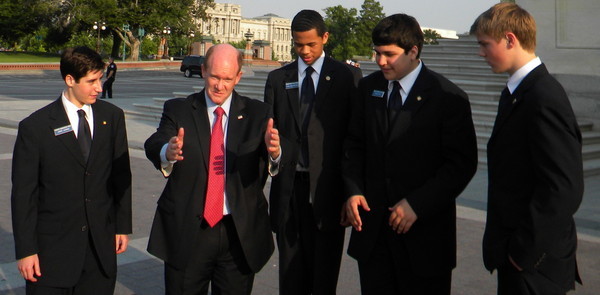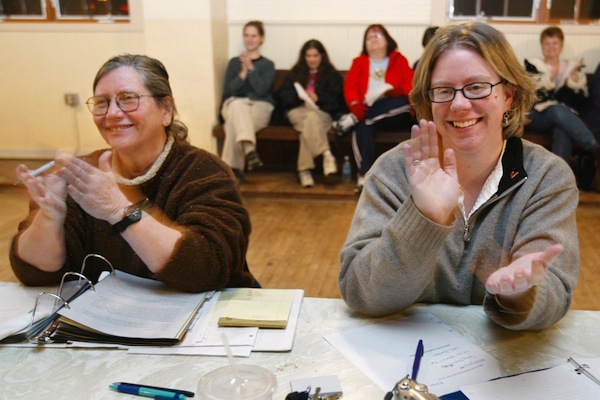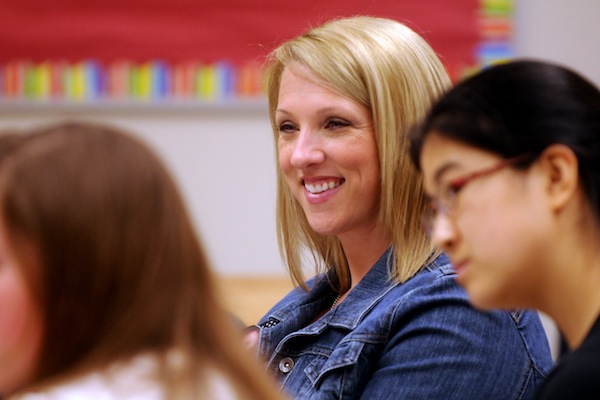Since Ladue students returned from summer vacation, changes have become apparent: haircuts, tans, and sunglasses. However, three remarkable seniors arrived to school with a greater knowledge and experience thanks to three elite summer programs.
At the University of Nebraska – Lincoln, senior Victor Wang underwent a fascinating experience at the Mathematical Olympiad Summer Program (MOSP). MOSP trains the team for the International Mathematical Olympiad competition. Unlike the NCO, the IMO team, which consists of six mathematicians including two alternates, is selected prior to the camp through the United States of America Mathematical Olympiad (USAMO) exam.
Even if those who take the exam do not qualify for the team, they can still attend MOSP if they score highly enough. Wang qualified for MOSP, but did not participate on the ICO team. The attendees who do not qualify for the team focus on acquiring deeper knowledge of math with the goal of increasing their exposure to complex math and of training potential future ICO team members. This past summer, Wang qualified to and attended MOSP for the third straight year, an impressive record of attendance at an elite camp that all but the most skilled math students never experience.
“My love for the subject has grown stronger every year and it’s nice to meet a lot of new people and form a lot of really strong relationships that will last a really long time,” Wang said. “People here think similarly to me and have similar interests.”
The format of the program focuses on introducing high level math concepts to students. Through classroom instruction and examinations, MOSP attendees explore the world of advanced math.
“It usually starts out with some classes and then there might be some tests,” Wang explained. “There’s a lot of free time. … There’s a computer lab; some people play frisbee or other sports like tennis, or socialize.”
Over the years, the program has essentially remained the same as during Wang’s first time attending. However, Wang has witnessed the development of the once-”rookies” and watched attendees undergo the same experiences that he did in the past.
“I think my favorite experience was co-directing the other competition for the rookies,” Wang said. “It just brought back a lot of memories of when I took that contest myself a few years ago and it’s nice to be at the other end of the spectrum. … Throughout the year, people submitted problems and I wrote a few myself, but mostly I helped compile all of those, select the best problems for the test, and grade solutions.”
Wang’s favorite MOSP experience allowed him to help organize contest for the “rookies” that Wang himself once participated in. Through compiling contest problems and directing their coding, Wang was reminded of his own days as a “rookie” at MOSP.
“I think my favorite experience was code directing the other competition for the rookies,” Wang said. “It just brought back a lot of memories of when I did that contest myself a few years ago and it’s nice to be on the other hand. … Throughout the year, people have submitted problems and I submitted a few myself, but mostly I helped compile all of those and direct the coding of the problems and also I helped create the solution.”
Now, Wang is studying math independently of the high school so he can choose his own schedule and study the topics that interest him. Among the complex topics that Wang plans to study are abstract algebra and number theory, topics that are typically covered at a college undergraduate level. Wang plans to major in math in college and expects to return to MOSP as a grader and instructor in future years. For now, Wang implements much of the knowledge he learned through MOSP through teaching other members of the Ladue Math Team.
“I mostly just teach at meetings every week,” Wang said. “A lot of them are the same struggles that I used to have.”
It was thanks to MOSP that Wang acquired some of the skills that help him teach Ladue’s Math Team today.

Meanwhile, senior Runpeng Liu immersed himself in a different subject at the Air Force Academy in Colorado,: chemistry. Like MOSP, the National Olympiad Chemistry (NCO) program focuses on training a group of six high school students to compete in the International Chemistry Olympiad. The team includes four main members and two alternates and is selected from the 20 chosen to attend the NCO camp.
“Most of us were really sleep deprived by the end,” Liu said, an unsurprising statement considering that an average day at camp contained over 10 hours of high-level chemistry.
According to Liu, each day followed a similar schedules. Attendees rose at 7 AM, ate breakfast, and then headed straight to a four hour lecture covering university topics such as organic and physical chemistry – topics that most students do not learn about until college, if at all. After lecture, camp members took 30 minute break for lunch before returning to the lab for four hours. Every other day, participants worked on 2-3 hour assessments after dinner, and on days without assessments, most returned to their rooms tostudy. In order to successfully complete the assessments, most needed to. The tests were challenging even for the remarkably talented chemistry students who qualified for the camp.
“They were really strict about not giving us grades because they didn’t want us comparing but I’d say the best I did was 70%, and even the top students, the ones that were chosen for the team, were getting 80’s,” Liu said. “It’s really difficult.”
The challenging environment encouraged Liu and others to expand their chemistry knowledge. As a result of the camp, Liu feels that he now has a better understanding of the nature of chemistry and of its unique place in science.
“I really learned that chemistry on paper is very different from the reality when you do it in the lab,” Liu said. “You know what it’s supposed to do, but in the lab, it’s so frustrating that it’s not working out. I was shouting in my head, ‘Why aren’t these atoms doing what they’re supposed to do? Why isn’t this reaction working?’ Chemistry is different from math, where what you have on paper is exactly what it is.”
Liu’s experience at camp has not only influenced his perception of science, but his involvement in it. As a result of lessons learned in the NCO lab, Liu decided to take a chemistry lab course at St. Louis University to combat what he saw as a weakness with lab work.
“I realized that I was really dysfunctional in the lab, so that’s why I enrolled in the lab course at SLU after coming home from camp,” Liu explained. “Science isn’t just what you read in a book or can do with calculations. You really have to be able to carry out the experiment in reality if you want to excel.”
NCO does not only introduce top chemistry students to more complex topics in science, but unites a diverse group ofstudents from all areas of the U.S. Since leaving the camp, Liu has remained in contact with over half of the other attendees, and saying goodbye proved difficult.
“Most of us were in tears since we’d all become a big family,” Liu recalled. “We signed each other’s lab coats and wrote each other long messages. It was really hard to leave.”
It was equally difficult for senior Jimmy Loomis to depart the Senate Page Program in Washington, D.C. After being appointed by Senator Claire McCaskill to serve as one of 30 Senate pages, Loomis spent the month of June in the Daniel Webster Residency Hall only a few blocks from the Capitol building. As a page, Loomis received incredible access to the U.S. Senate, known to many as the “world’s greatest deliberative body.”
“An hour before the Senate would convene, we would leave the building, walk a couple blocks down to the Capitol, go into the Senate, [and] prep the chamber by setting up the previous days Congressional record,” Loomis said. “There’s a calendar of business and an executive calendar.… We would get the presiding officer’smaterials, which included an ivory gavel that was a gift from the prime minister of India in 1954 that was shattered when then VP Nixon was presiding over the senate during the Red Scare hearing and cracked it in a fit of anger.”
His duties required close interaction with the leaders who shape American national policy. For instance, pages were often asked to track Senators down for a vote if they were not already present in the chamber.
“If there was a vote, we would have to find Senators,” Loomis recalled. “There’s locations we have to check throughout the Capitol to find Senators. The bathroom was one of them, which was always quite awkward, and the private dining room, and different committee rooms, just to page them that a vote was going on.”
On one memorable occasion, Massachusetts Representative Barney Frank appeared in the Senate for the final vote of the Farm Bill and exchanged words with Loomis.
“Just being able to be in that chamber was really a privilege and an honor,” Loomis said. “I remember one day, on the final vote of the Farm Bill, Barney Frank, a Massachusetts representative, walked in and asked, ‘What are we voting on?’” Loomis recalled. “I said, ‘Senator, I believe it’s the Thune Amendment of the farm bill, I can give you more details,’ and he said, ‘You know, even representatives of the House aren’t allowed to go into the well, only you are.’”
The media’s depiction of Congress often focuses on partisanship and an inability to accomplish policy goals. However, Loomis witnessed a spirit of compromise that may surprise those who prescribe to this pessimistic view of legislators.
“While I was there I really did see a lot of bipartisan compromise,” Loomis said. “What I saw on the Senate floor and what I saw on nightly news were hugely different pictures. I saw two huge pieces of legislation get passed – the farm bill in the Senate, which took probably 18 months of committee work in revision to get in its final form, and that was passed with 64 votes, which is amazingly bipartisan.”
“It was a feeling of ‘I’m lucky to have had this opportunity, but I had such a great time, I almost don’t want to leave it – bittersweet, one could say,” Loomis said.
Though departing their summer programs may have been bittersweet for Liu, Loomis, and Wang, their new friends, deeper knowledge, and fond memories are anything but. #







